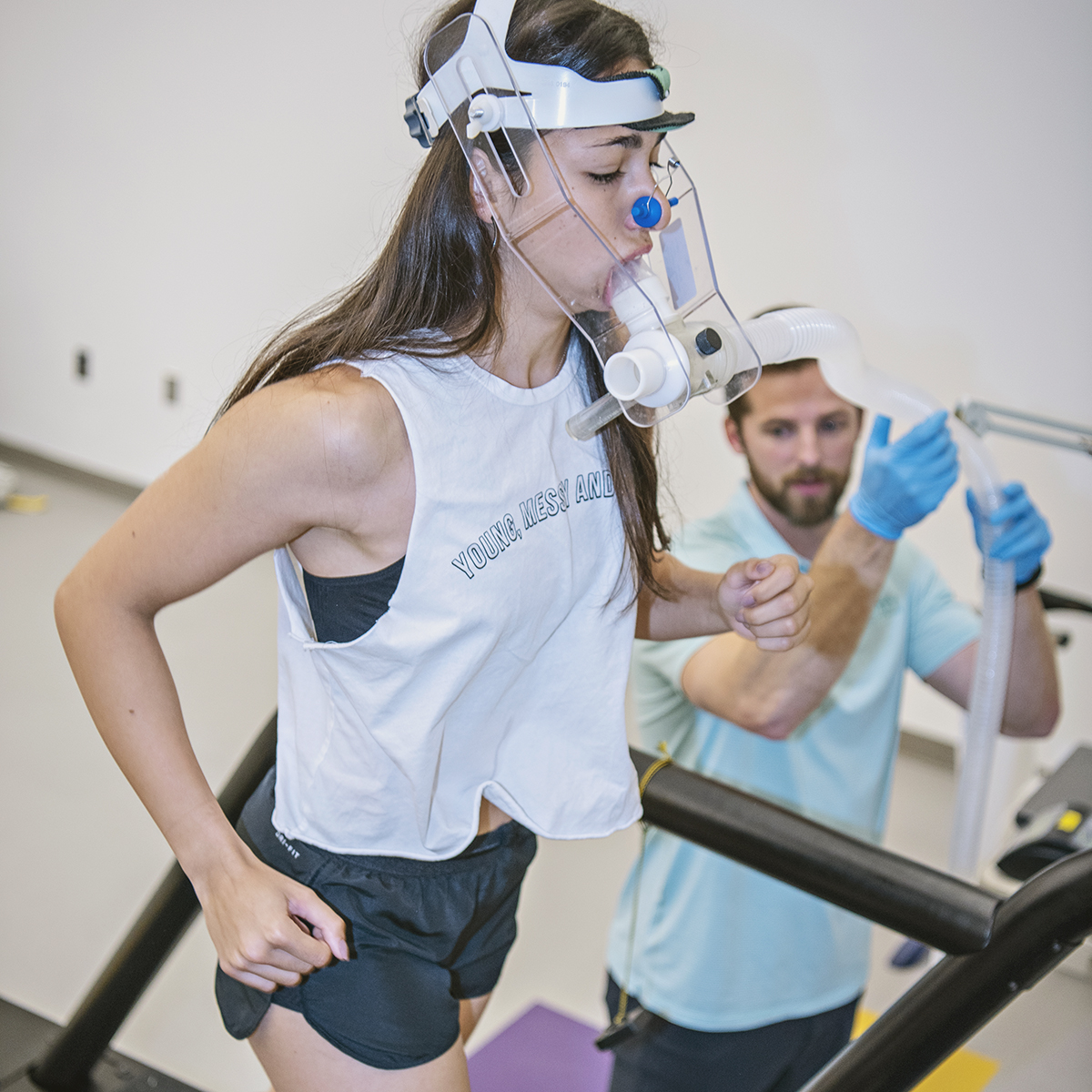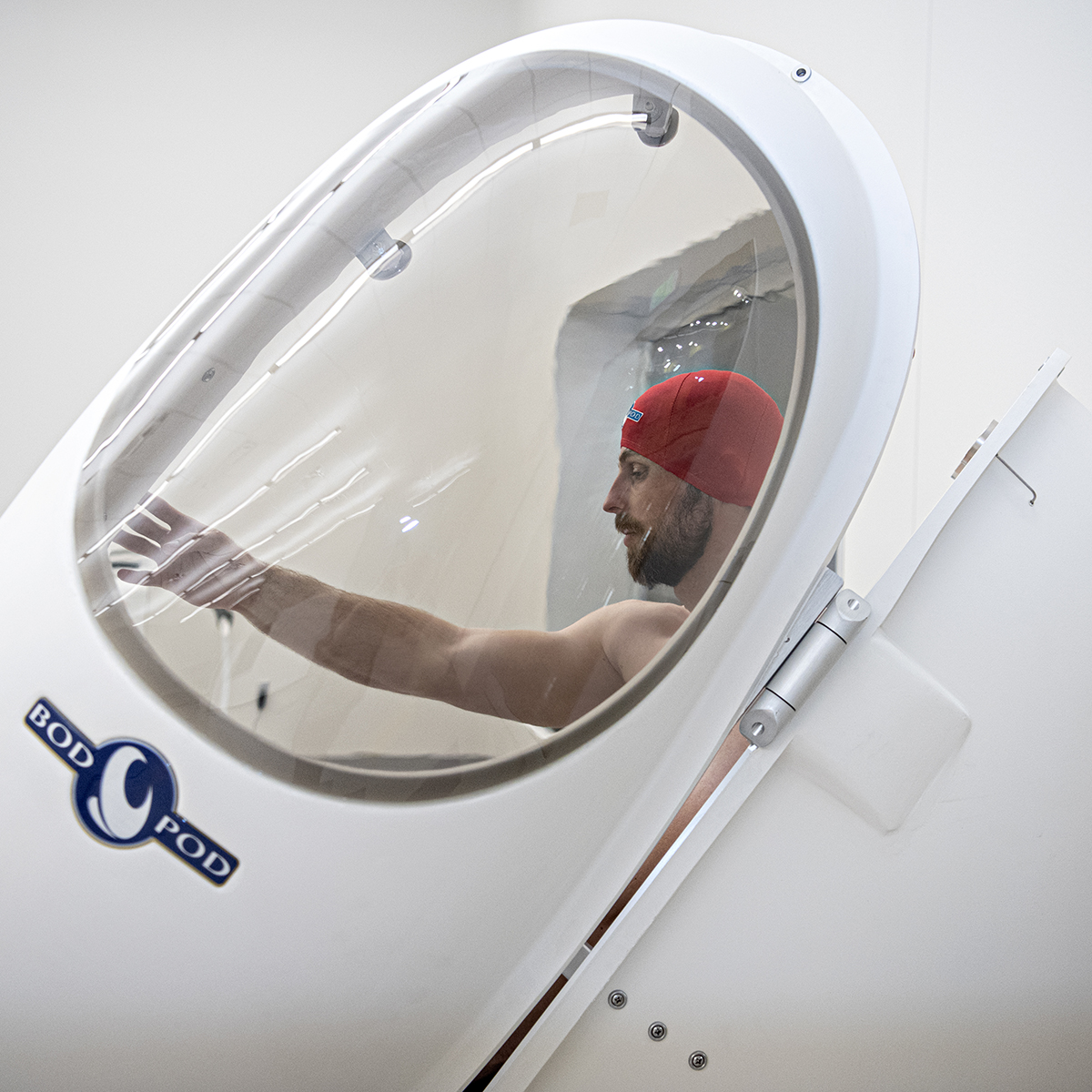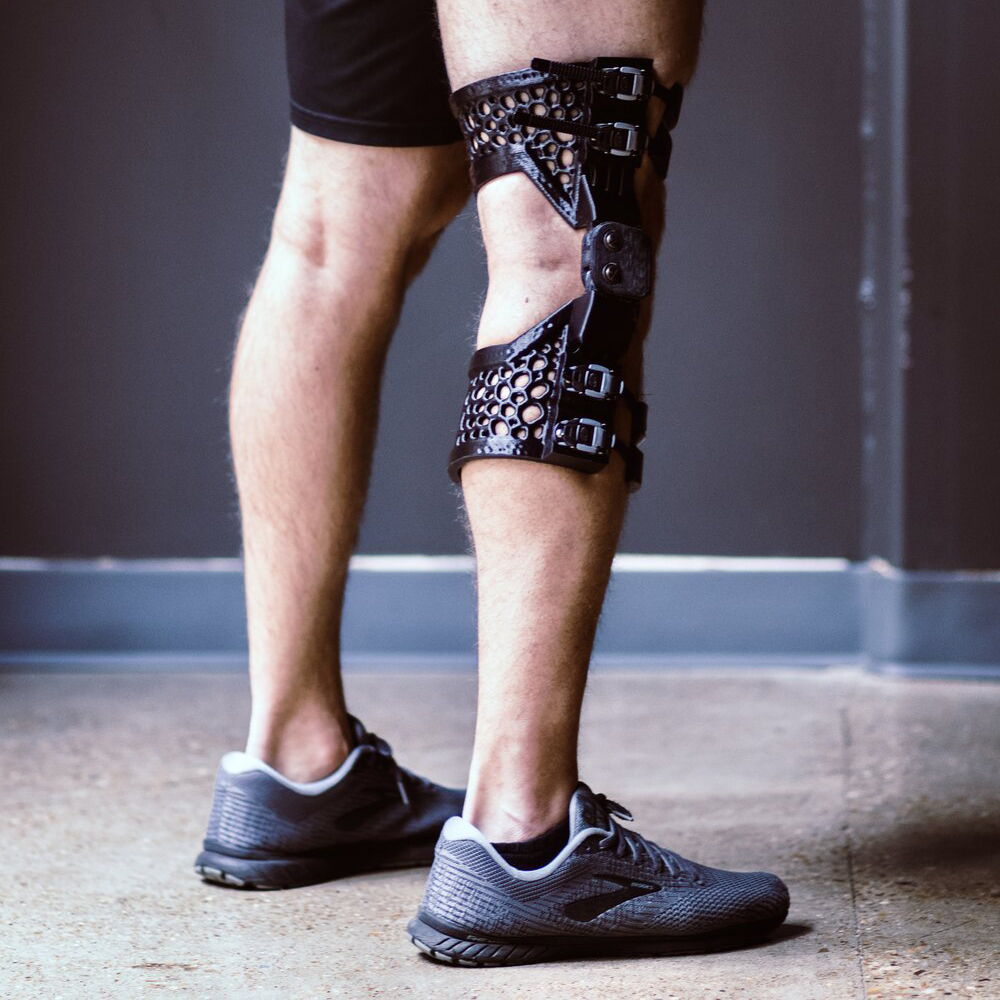LSUS Boosts Biotech Innovation for Health in Northwest Louisiana
January 18, 2022
By adding the Human Performance Lab, LSU Shreveport (LSUS) expands its role as a research hub and key service provider for the surrounding community, sparking innovation and new ventures.

Cory Coehoorn (on right) helps to operate the lab’s VO2 Max machine, which measures oxygen consumption. The new LSUS Human Performance Lab also includes equipment to measure temperature tolerance, body fat percentage, motor control, visual tracking, biofeedback, reactivity, brain activity, and more.
– LSU Shreveport
Baton Rouge—On what used to be six racquetball courts, there are now three top-notch research labs dedicated to the study of human movement at LSUS—an exercise science lab, a motion analysis lab, and a motor behavior lab—collectively known as the Human Performance Lab. Through its doors come entrepreneurs, coaches, physical therapists, athletes, and regular people with questions: “Why does my knee hurt when I run?” “Is this ankle brace doing what it’s supposed to?” “What kind of shape am I in?” And for athletes looking to compete or challenge themselves in faraway places, “Doing pretty good here around the lakeshore, but how will I feel when I bike 140 miles in the Himalayas?”
Cory Coehoorn, director of the LSUS Human Performance Lab, works with them to find answers. He also engages students in the process, who learn to run advanced tests on initially bewildering equipment, such as the VO2 Max machine, which measures maximal oxygen consumption, and the Bod Pod, which analyzes body composition.
“We can almost do and test anything related to the human body and performance here,” said Coehoorn, a stress physiologist who originally arrived in Shreveport as a member of a Canadian weightlifting team many years ago. “Our goal is to be a one-stop shop for anyone who wants to work with us.”
By March 2022, the Human Performance Lab will add yet another component, an environmental chamber, which is a 10- by 20-foot box that will have a treadmill and exercise bike and—more importantly—controlled humidity, pressure, and temperature—from -40 to 150 degrees. It will be the only environmental chamber for human data collection in the state of Louisiana.
“We’ll be able to put someone on Mount Everest right here in Shreveport,” Coehoorn said. “The chamber can mimic the environment of almost any place on Earth. We could even make it snow.”
“Our goal is to be a one-stop shop for anyone who wants to work with us.”
Cory Coehoorn, director of the LSUS Human Performance Lab
Coehoorn himself is particularly interested in working with and developing solutions for first responders, especially firemen who are exposed to frequent heat stress.
“When you and I go exercise outside in Louisiana in July, it’s going to be hot, but we’ll still have a gradual increase in core temperature,” Coehoorn said. “It’s much more extreme for firefighters. They run into a burning building and have to run around and climb stairs in heavy PPE, so their core temperature is going to elevate much faster.”

Cory Coehoorn exits the Bod Pod, which measures body composition. Through a $1.2 million investment in the Human Performance Lab, LSUS aims to establish itself as a leader in human performance evaluation. The combined capabilities can analyze an individual from a physiological, biomechanical, and cognitive perspective.
– LSU Shreveport
Coehoorn is researching what this rapid heat acquisition does to brain function and a person’s ability to make decisions, as well as how long the impact lasts.
“There’s an obvious potential for firefighters to suffer a cumulative or chronic stress response when called out again within 48 hours,” Coehoorn continued. “And meanwhile, stress is a known contributor to cardiovascular disease, which is the number-one killer of firefighters.”
This and other projects are leading to increased synergy with the recently established LSUS Cyber Collaboratory, which includes a maker space with 3D printers. One of their current collaborations is on a new safety device for firefighters.
The combined LSUS capabilities of the Human Performance Lab and Cyber Collaboratory are also enabling innovation in the surrounding business community. Eric Rippetoe is a physical therapist, double LSU grad, and founder of Bishop, a local company that designs and develops custom knee braces. While he started his company three years ago working mainly with athletes in high-impact sports, such as football, he’s recently pivoted to selling his custom braces as medical devices, opening up a much larger market.
“Our knee brace design can protect linemen from injury, but it’s also perfect for people coming off knee surgery or dealing with any sort of knee instability,” Rippetoe said. “More so than traditional knee braces since ours are custom-fit and won’t slide up and down.”
Rippetoe initially relied on the Cyber Collaboratory’s 3D printers to create one-off products, experiment with new materials, and improve his 3D printing skills. Once he found a winning combination in terms of both materials and manufacturing, he gained the confidence to invest in his own machines. He’s still planning on returning to the Cyber Collaboratory to experiment on new designs and more flexible materials for ankle braces.
“The printers they have at LSUS allow for a much larger variety and can print more exotic materials than I can comfortably invest in before trying them first,” Rippetoe said. “Especially materials with a lot of stretch, which my own printers just aren’t capable of doing. If I want to help my clients prevent or manage ankle sprains, I go back to the Cyber Collaboratory to do the prototyping.”

Bishop, a local business that recently pivoted from working mostly with athletes to manufacturing knee braces as medical devices, is developing its products and engaging with clients through both the LSUS Cyber Collaboratory and the LSUS Human Performance Lab.
– Bishop
With the addition of the LSUS Human Performance Lab, Rippetoe sees yet another opportunity to create better products for his clients, while preserving resources.
“I can go straight from prototyping at the Cyber Collaboratory to test my device at the Human Performance Lab and quickly be able to show benefits that have been well validated through research,” Rippetoe said. “And if it doesn’t work quite right, I can go back to the Collaboratory to change the prototype, print it out, and go right back to testing.”
Rippetoe recently had an airman from nearby Barksdale Air Force Base walk into his office. Or not walk, exactly.
“He was limping and had a hard time making turns and doing stairs,” Rippetoe remembered. “He was 30 days out from meniscus repair surgery and his knee felt so loose and unstable, he could barely move, and yet, he had to be on his feet for work.”
Shortly after, the airman left with the same type of custom knee brace Rippetoe had worked on developing in the LSUS Cyber Collaboratory.
“Hours later, I get this video,” Rippetoe said. “It shows him jogging on a treadmill with the knee brace on.”
As Rippetoe recently received approval to sell his knee brace as a medical device, he’s now looking forward to meeting up with osteoarthritis patients at the Human Performance Lab to analyze their gait.
“All osteoarthritis patients turn in at the knee when they walk, and if you see somebody limping, they’re always limping because of pain,” Rippetoe said. “Now, we can have them walk with and without a brace on and be able to see small changes in real time as to how it improves their gait pattern.”
“I can go straight from prototyping at the Cyber Collaboratory to test my device at the Human Performance Lab.”
Eric Rippetoe, founder of Bishop, a small Shreveport business that designs custom knee braces and recently started marketing them as medical devices
Coehoorn, meanwhile, has already connected with several physical therapy clinics in town.
“They can send their patients to us and we’ll run a gait analysis on them and send the report back to the physical therapist who will provide corrective measures,” Coehoorn said. “Using our equipment, we can analyze movement in the sagittal, frontal, and transverse planes. We can look at movement in all three planes and determine exactly what is happening, and help people get healthy again.”
Justin Miller, a trainer at CrossFit SBC in Shreveport, is also engaging with the LSUS Human Performance Lab.
“It’s cool to have the opportunity to see the inner workings of what’s going on with your body and look at fitness beyond just capacity and output the way we can in the gym,” Miller said. “Then we can use that knowledge and relay it back to training. Honestly, having this lab here is pretty amazing.”
Read more:
LSU Shreveport Cyber Collaboratory Develops High-Tech Tools and Talent in Northwest Louisiana, Finds New Partners (LSU Office of Research & Economic Development)
New LSUS Human Performance Lab Anticipated to Rank Among Nation’s Best Research Facilities (LSU Shreveport)